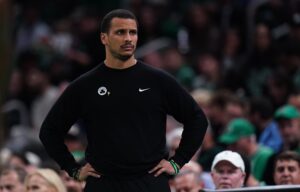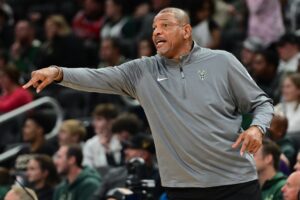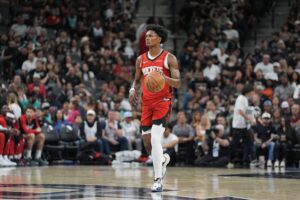Opening night was a great day for the Phoenix Suns. Deandre Ayton made his NBA debut, Devin Booker played his first game since signing his five-year, $158 million mega-deal, and it marked what some thought was going to be a new beginning for a franchise that has been mired in an eight-year-long playoff drought. The Suns took care of business at home, knocking off the Dallas Mavericks with a convincing performance, 121-100. Booker scored 35 and added 7 dimes, Ayton posted 18 points, 10 rebounds, and 6 assists, and Josh Jackson chipped in 18 points in 28 minutes off the bench. For the first time in a while in Phoenix, there was real excitement surrounding the Suns.
That optimism gained from opening night — and the sense of finally starting to turn the corner — has made the 10 games since all the more difficult to swallow for a Suns franchise that hasn’t had a winning season since 2013-14. And it’s been especially hard on the ultra-competitive Booker.
Preaching Patience Key for Devin Booker and Struggling Phoenix Suns
Two days after Booker drilled a pair of clutch shots to lift the Suns over the Memphis Grizzlies 104-102, the Suns had another winnable game on tap at home against the Brooklyn Nets. Simply put, the Suns stunk right from the tip. They scored 82 points, shot 35% from the field, and committed 20 turnovers. Rightfully so, they were booed off the court. And afterward, Booker voiced his frustrations.
“I’d be doing the same if I was up there,” Booker sympathized. “This losing, losing by double digits, has to stop.”
Next up were the Boston Celtics, who on the surface appeared as a massive challenge. In a surprising turn of events, the Suns were dominant through the first three quarters and led by as much as 22, before letting the lead slip away late in the fourth and falling in overtime.
So what does this all mean for Phoenix? In what has been just about as disastrous of a stretch following opening night as possible, the Suns and their fans need to take a step back and remember the long-term vision. Because right now, the short-term outlook isn’t nearly as bright.
The Suns Need Time, and Taking Shortcuts Isn’t an Option
Booker’s comments weren’t the first time he has voiced his desire for the Suns to start showing tangible improvement. In the off-season, Booker was quoted as saying that he was “done with not making the playoffs”. On the one hand, that ultra-competitive spirit is exactly what you want to see from your franchise player. But was it actually realistic for Phoenix to challenge for the top eight this season in the vaunted Western Conference? Probably not.
One can certainly understand where Booker is coming from. Since entering the league and being drafted by Phoenix 13th overall in 2015, all he has experienced is losing. Booker also knows that he, personally, is at a more advanced stage than his teammates, whom many nights he carries. Fresh off signing his big money contract extension with the Suns, Booker clearly felt that it was time for both himself and the Suns to take a step forward. Again, his enthusiasm and drive is admirable, and sure — the playoffs were a perfectly fine target to shoot for. But by using the ‘P-word’, Booker may also have been biting off more than he and the Suns could chew.
As much as Booker wants the Suns to be at that stage, as does everyone within and around the organization, they just aren’t there yet. At least, not with how deep the West is this year, and not with where Phoenix is as a franchise.
It may be a difficult ask for Booker, who’s experienced three long years of losing in Phoenix, and Suns fans who haven’t seen a playoff game since 2010. But in order to get there, Head Coach Igor Kokoskov needs more time. There are no shortcuts to take that will get the Suns any closer to being competitive than they are now.
How Do the Suns Improve?
Now that we’ve established that the Suns are going to need more time to sort this out, let’s take a closer look at how they can actually go about doing so. Above all else, it starts with support and belief in Kokoskov. Formerly an assistant with the Utah Jazz, Kokoskov came over to Phoenix hailed as an intelligent basketball mind and a strong teacher, two things that will be imperative in the Suns quest to improve. But the Suns’ organizational hierarchy also needs to remain 100% behind him and give him the time that he needs. That means that Kokoskov can’t be judged based on the team’s woeful start.
The front office could also help Kokoskov out by getting him a legitimate, starting caliber NBA point guard. Terry Rozier would be an excellent fit, and with rumblings that he is unhappy with his reduced role in Boston, the Suns need to take a long, hard look at what it would cost to bring him to Phoenix. The Suns have a plethora of depth on the wing, and Mikal Bridges in particular needs to be playing more minutes to be able to continually develop. Taking advantage of that depth and pairing it with some of the Suns draft capital in a potential trade package for a point guard is something that James Jones and company should be aggressively pursuing.
The bottom line is until the Suns find a solution to the point guard position, they will be limited in how many positive steps forward they can take as a team. And waiting until next June’s NBA draft, where there doesn’t appear to be an abundance of game-changing point guards available, doesn’t seem like the best choice.
Emphasis on Improvement From Within
For the most part, however, the Suns’ improvement needs to come from within. That’s because aside from the point guard issue, Phoenix has the talent that they need to be a very good team down the line if they develop it properly. On the plus side, Ayton has transitioned quite seamlessly to the pro game; his current statistical averages of 16.1 points, 10.9 rebounds, 3.0 assists, 0.8 blocks, and 0.7 steals would be considered very solid numbers for a five-year veteran in the prime of his career, let alone a rookie playing in his first 11 NBA games. Jackson and Bridges, meanwhile, have shown flashes here and there of their two-way potential. That’s important because they are two players who could play large roles in rectifying Phoenix’s abysmal team defense. Still, those three have significant work to do to help the Suns get to where they want to be.
Jackson, specifically, is not nearly consistent enough in terms of his decision-making and bringing his ‘A’ game every night. Ayton, on the other hand, has looked like a fish out of water at times on the defensive end of the floor, especially defending the pick and roll in the two-man game. We know Ayton has the god-given traits to be a very good defender thanks to his size and mobility. But he is a split second behind in his reads and his positioning could also use work. That’s something that he is going to have to gradually learn, with help from Kokoskov.
Time is the Key
The Suns aren’t in the position to legitimately compete for the playoffs right now, but they aren’t far off. The pieces – point guard aside – are in place, and there is a reason to believe in the talent that they have. Opening night may have teased us that Phoenix was further along than they really are, but it goes both ways. The Suns also aren’t as far away as they may seem the past couple weeks. What they need is time for Kokoskov to teach and work with this young core. While patience is running thin, there is no other way around it. Booker, the front office, and fans alike can do little else but give them the time that they need.
Main Image:
PORTLAND, USA – OCTOBER 3: Phoneix Suns guard Devin Booker (1) goes around Portland Trail Blazers center-forward Zach Collins (33) during the preseason game against the Trail Blazers in Portland, Ore., United States, on October 2, 2017. (Photo by Alex Milan Tracy/Anadolu Agency/Getty Images)






